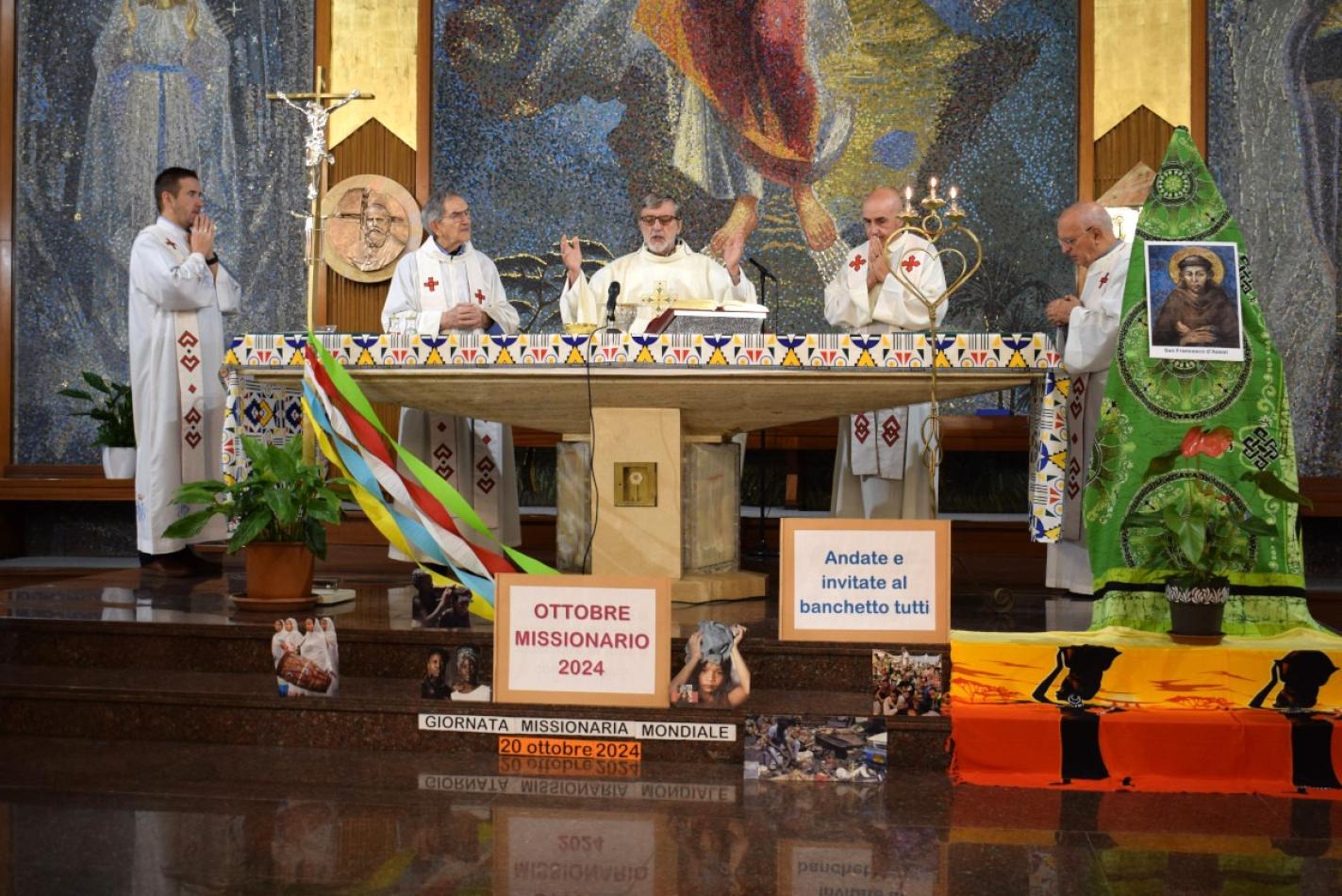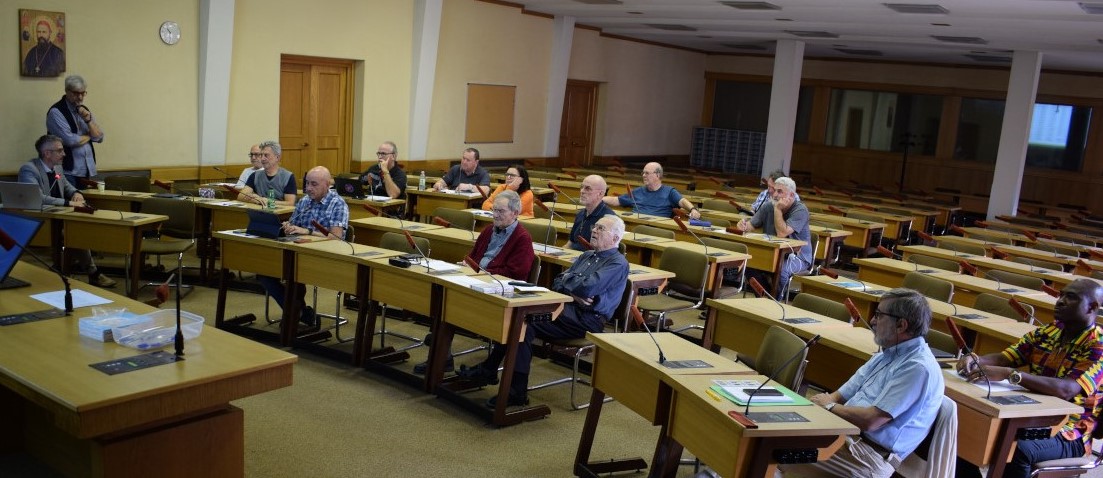Daniel Comboni
Comboni Missionaries
Institutional area
Other links
Newsletter
Friday, October 4, 2024
The superiors and bursars of the Comboni communities of central and southern Italy met from 1st to 4th October, at the Generalate in Rome, to share, evaluate and plan their pastoral and missionary activities in each of the contexts in which they operate. The meeting concluded with a Eucharist together with the Curia community. The celebration was presided over by Father Gian Battista Moroni, Provincial Councillor, who emphasised the witness of poverty and humility of St Francis of Assisi, whose feast day was celebrated that day.
The 15 participants of the zonal meeting represented the communities of Lucca, Florence, Fano, Rome, Castel Volturno, Bari, Lecce and Palermo. The confreres from the communities of Troia and Casavatore-Naples justified their absence.
The first day of work, 2nd October, was dedicated to ongoing formation on the theme of integral ecology and the sustainability of the Planet in the light of the new prophetic paths outlined by the ‘Economy of Francis’, to give a human face to the global management of goods and services.
Besides sharing the activities of each community, the transversal topic on the agenda was a reflection on the state of the economy of the individual Comboni communities – and of the Italian province as a whole – and their social impact on the territory, keeping in mind the planning of the community social budget for the year 2024/2025.
For a serious review of commitments and an evaluation of our presence in the country, it is necessary to combine economic sustainability and the social impact of the communities, among other things, with evangelical and missionary criteria. (MCCJ Bulletin)
Father Filippo Ivardi shares his reflection on what was discussed at the meeting.
Prophecy and global economic challenges
It is now well known that global consumption exceeds the Earth’s biocapacity, i.e. the regenerative capacity of the Planet: humanity’s demand for natural resources exceeds the Earth’s capacity to regenerate them. In other words, humanity is consuming – and polluting – at such a level that it would take 1.7 planet Earths to sustain current consumption and reabsorb climate-changing emissions.
In 2024, the global ecological footprint per person is estimated at 2.6 global hectares (gha),[1] while the available biocapacity is about 1.6 gha per person, leading to a significant ecological deficit.
But these figures refer to ‘average’ values. There are huge inequalities, which highlight the issue of social and climate justice. For example, Italy’s ecological footprint – aligned with the EU average – is estimated at 4.6 gha per person. This means, more concretely, that if the entire world population had our lifestyle, we would need almost 3 planets to sustain it. We are, therefore, consuming the resources of future generations, always increasing the ecological debt.
It was with this exercise that the meeting of Comboni missionaries present in central and southern Italy began, eager to tackle the great global challenges that call into question the proclamation and practice of the Gospel today. First among these challenges is the “economy that kills” – as Pope Francis calls it – which has long been at the mercy of finance that crushes the poor and the Earth.
The resulting climate change has now reached a point of no return, and predictions of what may happen in the future are also reeling. Despite the artificial intelligence (and sometimes dementia) at our disposal, we do not know how the Earth will react. We are increasingly stressing ecosystems and have passed the regenerative capacity of the system, continually going into debt. The same indicator known as Earth Overshoot Day,[2] which measures the day on which each country runs out of resources to meet its needs for goods and services in that year, is always going down, and this year planet-wide it was 1st August.
To turn the tide, Pope Francis wrote a letter to young economists, entrepreneurs and other economic actors to find new human paths and organise the management of the ‘Common Home’ in a radically different way, in the style of Francis of Assisi, from whom the pontiff draws inspiration. This is how the ‘Francis Economy’ Movement was born, now widespread in about 100 countries and made up of companies, start-ups and economic initiatives that want to put people and not profit at the centre. It is a style of production, distribution and consumption that, going beyond the classical linear rhythm, with the consequent accumulation of waste, is oriented instead towards a circular process where reuse and recycling take place, and waste is minimised: certainly an important turning point, although still within the logic of growth, the undisputed idol of every economic theory. The ‘R’ of reducing does not even enter the mindsets of Christian communities, and sobriety is discarded a priori as the way to regenerate a sustainable economy with a human face. Francis of Assisi strove precisely to make his companions and the people he met grasp what he experienced on his skin: “less is more”, as Francis of Rome takes up precisely in Laudato si’ (LS 222), given that the constant accumulation of possibilities for consumption distracts the heart and prevents one from appreciating everything and every moment.
Francis’ invitation has thus become a process that wants to try to change the course of the race towards the abyss of the unbridled hoarding of resources, of wars on the rise – precisely for economic reasons –, and of the obvious consequences such as inequality and growing global migration. The protagonists of this journey are young people! And some of them, teachers at the Free University Maria SS. Assunta (LUMSA in the Italian acronym) and social entrepreneurs, testified to us how reflection, the training of many young people, associations and institutions, and the good practices of economies at the service of the poorest are advancing. Very significant was the experience of Giandonato Salvia, awarded the ‘Cavaliere della Repubblica’ prize by President Mattarella, creator of the ‘Tucum’ app, able to organise the circle of donations for the most fragile individuals and families in terms of goods and services according to the ‘suspended coffee’ model.
These are creative experiences, which have certainly impressed us, even if the lack of a radical critique of an economic system that enslaves and discriminates, instead of being at the service of all, remains in the background.
With our eyes and hearts in the peripheries of the world, as missionaries we feel it is our duty to denounce the excessive power of transnational corporations that hold entire states and peoples in their grip, imposing their economic domination, but also the idolatry of money that continues to buy the hearts of so many people and even so many Christian faithful and communities. All this results in the drowsiness of consciences and the consequent almost total indifference on the part of Church circles towards the growing production of arms, towards the arms transactions carried out by banks with our money, countered by the arduous lobbying campaign against the Armed Banks (www.banchearmate.it), and towards sponsorships, by companies of dubious ethicality, of Church events, such as the forthcoming Jubilee.
The prophetic thrust of the Gospel always invites us to look at the flow of the economy from the point of view of its victims and to dream for local and global political communities of a redistributive economic and climate justice of resources, also through the instrument of progressive taxation on incomes (and salty on extra-profits), the cancellation of the debt of the poorest countries, and a stop to the savage and unjust hoarding of resources by the richest worlds that starve entire peoples, keeping them in beggary conditions.
Only a renewed integral cosmic spirituality can give new breath to an ethics and politics, both locally and globally, capable of implementing concrete processes of justice and solidarity with the little ones, which restore the flavour of the Gospel to those actions – still too disassociated from the Good News of Jesus - that involve the wallet.
Rome, 4th October 2024
Father Filippo Ivardi Ganapini, mccj
[of the community of Castel Volturno – Caserta].
[1] The English Global Hectare (Gha) represents the average value of productivity, in biological terms, for each hectare of land on the planet.
[2] Earth Overshoot Day is a crucial (and effective) indicator of global ecological impact, providing a concrete perspective on how fast we are using the planet's resources compared to its capacity to sustain us.





